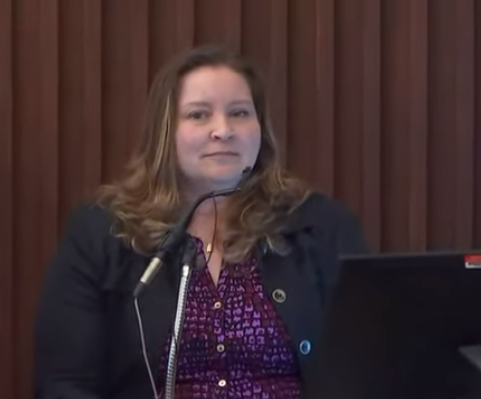By DAMIEN FISHER, InDepthNH.org
DOVER – Timothy Verrill is the only man whose DNA was profiled by state forensic technicians during the investigation into the 2017 murders of Christine Sullivan and Jenna Pellegrini, even though he was not the only man to have a sample of his DNA collected by investigators.
Prosecutors called Melissa Staples, director of the New Hampshire State Police Forensic Laboratory, as their last witness on Friday in Strafford Superior Court. After Staples testified about not finding Verrill’s DNA under Sullivan’s fingernails, the state rested its case.
Verrill maintains he did not kill the women, and the state’s witnesses placing him at the Farmington house on the day they are believed to have been murdered are all connected to the drug trafficking business operated by Sullivan and her boyfriend Dean Smoronk.
Most of Friday’s session featured the recording of state witness Stephen Clough’s prior testimony at Verrill’s first 2019 trial which ended in a mistrial. Clough died after the 2019 trial fell apart when it was learned prosecutors had not handed over exculpatory evidence in the case, including the fact Clough himself had been a suspect in the murders as well as an informant for the DEA.
Clough’s old testimony caught out an inconsistency in his story. Clough claimed he saw a blood stain on Pellegrini’s mattress when he went to check on the house for Smoronk on Jan. 28. Clough did not contact police about the blood, and he did not tell investigators about the blood in the weeks after the murder took place.
“I didn’t call the police, and I should’ve,” Clough testified in 2019.
Clough’s 2019 testimony also indicates Smoronk beat Sullivan, and that Smoronk had a violent temper. Sullivan told Clough that if she were ever killed, Smoronk would be the killer. Clough at one point testified Smoronk accused him of stealing and wanted him dead.
“I know he wanted — he wanted to have me killed; I know that. But I don’t know specifically why. And the guy’s crazy, and that’s — what can I tell you?” Clough testified.
Clough’s testimony included the fact he had scratches on his arms and legs a day after the women’s bodies were found, and that he had given police a DNA sample, one apparently not used by the state’s Crime Lab to test against the samples taken from the murder scene.
While there was male DNA found under Sullivan’s finger nails, Staples testified she only had that DNA tested against Verrill’s sample because that was the only DNA profile developed by the lab. Staples said lab technicians rely on investigators to know what and who to test. The tests came back and excluded Verrill, she testified.
“When someone’s excluded, essentially, the number’s 100 percent that’s not the person,” Staples said.
Verrill’s DNA was found on a white baseball cap that also contained blood stains that came back as Sullivan’s blood. Verrill was trying to start a clothing business and at the time was known to wear blank, white baseball caps he bought for that business.
Verrill was part of the drug dealing business, and friends with Sullivan. He even lived at the Farmington house she shared with Smoronk. Smoronk and Sullivan were breaking up their romantic relationship, and Smoronk reportedly wanted to take control of the drug business. He allegedly offered a Florida man money to kill Sullivan, according to the withheld evidence.
Prosecutors theorize Verrill killed the women on Jan. 27, 2017, when Smoronk was reportedly in Florida. The theory is based on the fact Verrill was heavily using methamphetamine and cocaine in the weeks leading up to the murder.
State witness Josh Colwell testified Verrill became paranoid that Pellegrini was a police informant. Colwell, however, was reportedly working with Smoronk to take over the drug business from Sullivan.
Clough himself was a methamphetamine user and was suffering from paranoid delusions, according to the evidence police and prosecutors withheld during the first trial. At one point, investigator New Hampshire State Police Lt. Brian Strong, told Clough to get help.
The case could go to jurors by the end of next week. The trial is paused for Monday, in order to give time for a defense witness to travel to New Hampshire.





